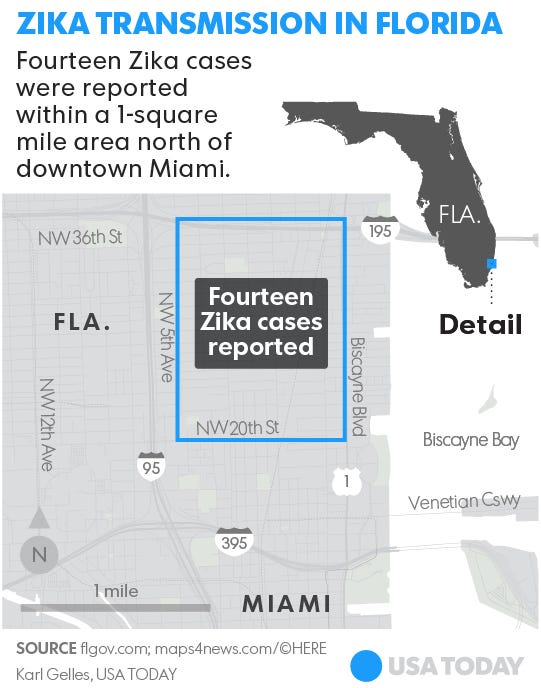CDC: All pregnant women should be assessed for Zika exposure
All pregnant women in the U.S. should be assessed for possible Zika exposure during every prenatal visit, the Centers for Disease Control and Prevention said Monday
The advice from the CDC came as federal health officials also urged women who are pregnant or are considering becoming pregnant to avoid a Miami neighborhood that is the site of a Zika outbreak. Zika can cause catastrophic birth defects in developing fetuses, including microcephaly, which results in an abnormally small skull and, in most cases, incomplete brain development.
The CDC has warned pregnant women since January to avoid areas with Zika outbreaks. Until now, those travel warnings were limited to foreign countries and U.S. territories, such as Puerto Rico and the U.S. Virgin Islands.
Now, the CDC warns pregnant women to avoid the Wynwood neighborhood in Miami, where 14 people have been infected with Zika. That move appears to be unprecedented in CDC history.
While pregnant women don't automatically needed to be tested for Zika, health care providers should ask women about recent travel, as well as any travel by her sexual partner. Those who should be tested include pregnant women with symptoms of Zika, which include a fever and rash, as well as pregnant women who may have been exposed through travel or sex, according to the CDC.
Pregnant women who live in or frequently travel to Wynwood to be tested for Zika in the first and second trimester, the CDC said.
Although Zika is mostly spread by mosquito bites, both men and women can transmit the virus through sex.
The CDC advises all pregnant women to avoid mosquito bites, through wearing long sleeves and insect repellent, especially if they live in an area with the main mosquito species that spreads Zika, the Aedes aegypti. These mosquitoes live in 30 states and several territories, including Puerto Rico.
The CDC also advised the sex partners of pregnant women to protect these women from Zika infection.
Sexual partners of pregnant women who have traveled to Wynwood, or other areas with Zika outbreaks, should use condoms or other barrier methods for the rest of a woman's pregnancy, the CDC said.
Couples planning to become pregnant should also consider their risk of Zika, the CDC said.
Women and men who have traveled to Wynwood since June 15 should wait at least eight weeks before trying to conceive a child, according to the CDC. Women and men who live in Wynwood or frequently travel there should talk to their health care provider.
The new Miami-related health advice is similar to the recommendations that the CDC have given people who've traveled to other parts of the world with Zika infections, said Henry Wu, an assistant professor of infectious diseases at the Emory University School of Medicine in Atlanta.
"It's a very reasonable thing to do," Wu said. "The number of cases that they've diagnosed is enough to suggest that there was a significant amount of transmission going on. We do know that about four in five cases has no symptoms, so we need to assume there could be many more."
Jeffrey Klausner, a professor of medicine and public health at the UCLA David Geffen School of Medicine, also described the CDC advice as sensible, given the risks to developing fetuses.
"Deferring pregnancy or using condoms with possibly infected partners makes sense," Klausner said. "Condom use during pregnancy will also reduce the risk of common STDs."
Although the Zika virus can be devastating to unborn babies, it is not usually dangerous for adults. Women who are infected are believed to become immune for life. Scientists don't believe that Zika infections can harm future pregnancies, said Peter Hotez, dean of the National School of Tropical Medicine at Baylor College of Medicine in Houston.
To be safe, the CDC said that women who have Zika should wait at least eight weeks before trying to get pregnant.
Doctors don't know how often sexual transmission of Zika occurs, Klausner said. Although scientists don't know exactly how long the Zika virus can survive in semen, studies have found viral genetic material in semen for several weeks after men were infected. Based on that evidence, the CDC advises men with Zika to wait at least six months before trying to conceive.
